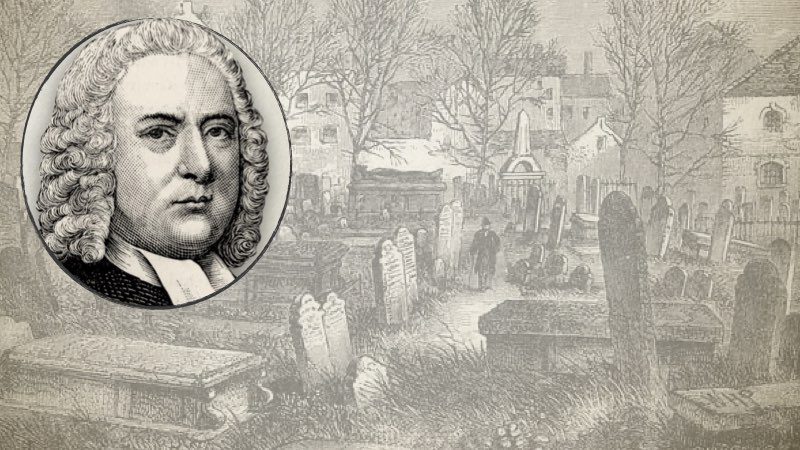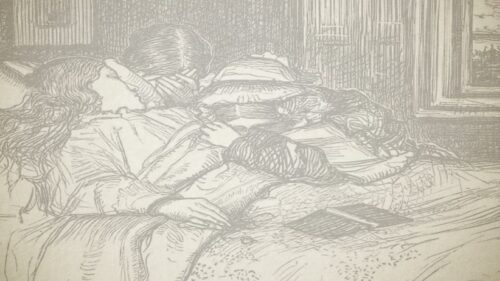
The Life And Death Of John Gill
J. A. Jones, “Bunhill Memorials: Sacred Reminiscences Of Three Hundred Ministers And Other Persons Of Note, Who Are Buried In Bunhill Fields, Of Every Denomination” (1849):[1]
John Gill, D.D., Baptists. In hoc Coemetrio conduntur reliquae Joannis Gill, S. T. P. Viri vitae integri. Discipuli Jesu ingenui; preconis evangelii insignia, defensoris fidei Christianae strenni, qui ingenio, eruditionae, pietate, omatus, laboribusque per inagnis semper invictus annos supra quin- quaginta. Domini mandata facessere ecclesiae res adjuvare, hominum salutem persequi, fervore perpetnoardenti contendit.
In Christo placide obdormivit Pridie id Octobris, A.D. 1771, setatis suae 74. The above inscription was written by Dr. Samuel Stennett.
Translation.—In this Sepulchre are deposited the remains of John Gill, professor of Sacred Theology. A man of unblemished reputation, a sincere disciple of Jesus, an excellent preacher of the gospel, a courageous defender of the Christian faith. Who, adorned with piety, learning and skill, was unwearied in works of prodigious labour for more than fifty years. To obey the commands of his great master, to advance the best interests of the church, to promote the salvation of men, impelled with unabated ardour, he put forth all his strength. He placidly fell asleep in Christ, the 14th day of October, in the year of our Lord, 1771, in the 74th year of his age.
Tomb, E. and W. 20, 21,—N. and S. 65, 66.
A full account of this great Divine, would extend far beyond the limits of this work; the editor must therefore, aim at all possible brevity.—“Dr. Gill leads us into an ocean of divinity; by a system of doctrinal and practical religion, and, by a judicious and learned exposition of the Old and New Testaments.” John Ryland, A.M.
John Gill was born at Kettering, in Northamptonshire, Nov. 23,1697. His mind was seriously impressed with divine things when he was about twelve years of age. Mr. Wallis, of Kettering, having preached a sermon from Gen. 3:9, “And the Lord God called unto Adam, and said unto him where art thou?” These interrogations sounded in his ears, and pierced his very soul. “Sinner, where art thou? What a wretched condition art thou in! What will be thy state eternally? Art thou able to endure everlasting burnings?” He now began to see and feel, the depravity of his nature, the exceeding sinfulness of sin, and his need of salvation by Christ. The Lord was soon graciously pleased to reveal his Son in him, and afford him joy and peace in believing. He joined the Baptist Church, at Kettering, Nov. 4, 1716, being then nineteen years of age. The same evening, at a meeting for prayer, he read and expounded the 53rd chapter of Isaiah. The next Lord’s Day evening he delivered a discourse from 1 Cor. 2:2, “For I determined not to know anything among you, save Jesus Christ and him crucified.” This was his first sermon; and the Lord enabled him to abide by his determination even to the end, so that “Christ and him crucified,” was his constant theme from first to last. Soon after this, he removed to Higham Ferrers, and preached occasionally in the adjacent villages. Early in the year 1719, the Baptist Church meeting, at Fair Street, Horslydown Southwark, having by death lost their pastor, Mr. Benjamin Stinton (son-in-law of the famous Benjamin Keach), invited Mr. Gill to come up to London and preach to them. The result of this visit was, his becoming their Pastor; and he was ordained to the pastoral office over them, March 22, 1720. With this church he remained to the close of his ministerial labours, a period of upwards of fifty-one years. In the year 1729, he commenced a Wednesday evening lecture, in Great Eastcheap, which he continued for more than twenty-six years, declining it in 1756. His farewell sermon was from Acts 26:22, Having obtained help of God, I continue to this day, &c. He told his audience, “I have nothing to complain of, but I find my natural strength will not admit me to preach so frequently, being now in the fortieth year of my ministry, so that it is time for me to have done with extra service. But a principal reason is, that I may have a little more time to attend to, and finish an arduous work upon my hands; and I have no other way of easing myself, but by dropping this lecture.” This “arduous work” was none other than his “Exposition of the Bible,” which was first published in nine volumes folio; to which he afterwards added his “Body of Divinity,” in three volumes quarto; with others of his writings. All these amazingly laborious and voluminous works, were written out by his own hand, and were also corrected and revised by him as they came from the printer, no one reading the proof sheets but himself. In the year 1770 (the year before his death) he wrote in the margin of a sheet of letter-press, “the last of more than ten thousand!”
In 1748 Mr. Gill was presented with the diploma of D.D., by the University of Aberdeen. Upon being complimented by his friends, on the honour conferred upon him, the good man quaintly replied, “I neither sought it, nor thought it, nor bought it.” A new meeting house, having been erected for his church and congregation in Carter Lane, Tooley Street; Dr. Gill opened it October 9th, 1757, preaching from Exod. 20:24, “In all places where I record my name, &c.” Upon this occasion, in his sermon, the Dr. said, “We enter upon this new place of worship, by recording the name of the Lord therein; namely, by preaching the doctrines of the grace of God; of free and full salvation alone, by Jesus Christ; and by the administration of gospel ordinances, as they have been delivered to us. What doctrines may be taught in this place, after I am gone, is not for me to know; but, as for my own part, I am at a point; I am determined, and have been long ago, what to make the subject of my ministry. It is now upwards of forty years since I entered into the work, and the first sermon I ever preached was from those words of the apostle, I determined, &c. (1 Cor. 2:2.) Through the grace of God, I have been enabled, in some good measure, to abide by the same resolution hitherto; and I hope, by Divine assistance, I ever shall, as long as I am in this tabernacle, and engaged in this solemn work. I am not afraid of the reproaches of men; I have been inured to these, from my youth upwards; none of these things move me.”
At the commencement of his spiritual campaign, he buckled on his Armour, and never unloosed it but to put on his Shroud. “So far as the doctrines of the gospel are concerned, Gill never besieged an error which he did not force from its Strong-holds; nor ever encountered an adversary to truth, whom he did not baffle and subdue. His Doctrinal and Practical Writings will live, and be admired, and be a standing blessing to posterity, when their opposers are forgotten, or only remembered by the refutations he has given them. While true religion and sound learning, have a single friend remaining in the British Empire, the works and name of Gill will be precious and revered.”—Toplady.
With holy calmness, and heavenly peace of mind, this great man of God placidly fell asleep. His last words were—“O my Father, my Father!”
If, from good works could rise our last relief.
Who more could boast than this renowned chief?
But these afforded not the least delight;
They vanish’d, like a vapour, out of sight.
Not on his character, which stood renowned.
Not on his labours, which Jehovah crown’d.
He plac’d the least dependence;—from his soul
He did most steadily renounce the whole:
And for salvation, fix’d on the rich blood
And righteousness of his incarnate God!
There were his hopes, his rest, his joy, his crown.
And, at His feet, he laid his honours down.
Clear was his prospect of the promised land,
Where in full view he saw his Saviour stand;
He on his everlasting love relied.
Sunk in his arms, and in full glory died.
——————————-
[1] The reader is encouraged to visit Bunhill Fields, a nonconformist cemetery located at 38 City Road, London, England.
John Gill (1697-1771) was a Strict and Particular Baptist preacher and theologian. He was appointed the Pastor of Goat Yard Chapel, Horsleydown, Southwark, serving this position for fifty-one years. He was the first Baptist to write an exhaustive systematic theology, setting forth High-Calvinistic views and a clear Baptist polity which became the backbone for the churches subscribing to them. John Hazelton wrote of him:
”[Augustus] Toplady held in high regard Dr. John Gill (1697-1771), and applied to him and to his controversial writings what was said of the first Duke of Marlborough—that he never besieged a town that he did not take, nor fought a battle that he did not win. Gill's book on the Canticles is a beautiful and experimental exposition of Solomon's Song; his "Cause of God and Truth" is most admirable and suggestive; and his "Body of Divinity" one of the best of its kind. His commentary upon the Old and New Testament is a wonderful monument of sanctified learning, though it has been so used as to rob many a ministry of living power. It is the fashion now to sneer at Gill, and this unworthy attitude is adopted mostly by those who have forsaken the truths he so powerfully defended, and who are destitute of a tithe of the massive scholarship of one of the noblest ministers of the Particular and Strict Baptist denomination. The late Dr. Doudney rendered inestimable service by his republication, in 1852, of Gill's Commentary, printed at Bonmahon, Waterford, Ireland, by Irish boys. Gill was born at Kettering, and passed away at his residence at Camberwell, his last words being: "O, my Father! my Father!" For fifty-one years, to the time of his death, he was pastor of the Baptist Church, Fair Street, Horselydown, and was buried in Bunhill Fields. His Hebrew learning was equal to that of any scholar of his day, and his Rabbinical knowledge has never been equalled outside Judaism. His "Dissertation Concerning the Eternal Sonship of Christ" is most valuable, and this foundation truth is shown by him to have been a part of the faith of all Trinitarians for about 1,700 years from the birth of our Lord. In His Divine nature our blessed Lord was the co-equal and co-eternal Son of God, and as such He became the Word of God. The Scriptures nowhere intimate that Christ is the Son of God by office, or that His Sonship is founded on His human nature. This is not a strife about words, but is for our life, our peace, our hope. Dr. Gill's pastoral labours were much blest; to the utmost fidelity he united real tenderness, and at the Lord's Supper he was always at his best.
"He set before their eyes their dying Lord—
How soft, how sweet, how solemn every word!
How were their hearts affected, and his own!
And how his sparkling eyes with glory shone!"
John Gill, (1) Commentary On First Thessalonians (Complete)
John Gill, (2) Commentary On Second Thessalonians (Complete)
John Gill, (3) Commentary On First Corinthians
John Gill, A Biography By George Ella
John Gill, A Lecture By George Ella
John Gill, Doctrinal And Practical Body Of Divinity
John Gill, Extracts
John Gill, Identifying The Biblical Covenants (Complete)
John Gill, The Cause Of God And Truth




